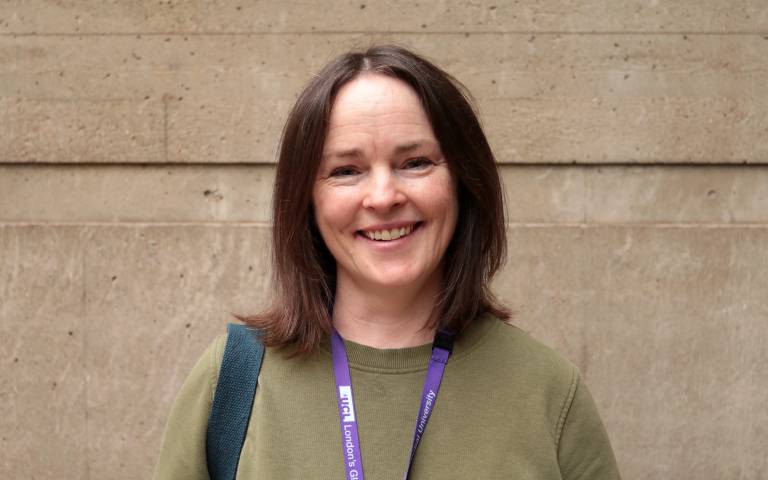Maureen is a Specific Learning Difficulties (Dyslexia) MA student, class of 2023. She talks to us about her experience studying at IOE.

What is your educational background?
I had gained a first degree in Psychology before completing a PGCE in Primary Education. After 26 years of being a primary school teacher, I decided to take the plunge and return to studying.
What are your motivations for pursuing a graduate-level qualification?
When my son was young, the strategies he used to read were unusual. He seemed to be doing it differently to other children. He had clear strengths in literacy, yet he had specific weaknesses that he seemed to be working around.
I saw this in other children I taught, and I became curious about the psychology behind this.
“I felt that a Master's level qualification in Specific Learning Difficulties would provide the depth of understanding and strategies I needed to support these children.
Why did you apply to UCL for graduate study?
UCL was highly recommended by a member of my local dyslexia association, who was already taking the course. She spoke of the great support she received and the comprehensive course on offer. She encouraged me to look at the course.
“When I investigated the programme, I was impressed by the fact that I could challenge myself academically, whilst also gaining the professional qualifications I would need to practice as a specialist teacher and dyslexia assessor.
I also liked the fact that I could work part-time while completing the course flexibly.
When comparing this course to other similar graduate courses, the course at UCL had outstanding credentials.
“IOE was ‘world-leading’ for education research and provided the opportunity to work with experts in the field of dyslexia and education research.
What is the best thing about your course?
As I work and have a family, I was pleased that my attainment was established through a series of assessment tasks. This allowed me to organise my own study time and avoided the added pressure of formal exams.
The course itself was well-organised and well-delivered. The support from staff and peers was invaluable. We were assigned an experienced tutor/mentor for the Evidence Informed Practice module and the Assessment of Specific Learning Difficulties module. The support I received from this tutor was excellent. The detailed feedback and advice were helpful in developing my skills.
“I would also like to mention our wonderful course leader, Elisabeth Herbert. Everyone on the course had Liz as a personal tutor. She was exceptional in this role – she always knew exactly when to call a tutor group meeting.
In these meetings, she provided words of wisdom, reassurance, and encouragement at exactly the right time, every time!
What do you find interesting about your field of study and what inspires you?
Everything! Initially, I loved learning about the science behind language and literacy acquisition, and theories for the causes of dyslexia. It was so interesting to apply this knowledge to things I had observed and wondered about for many years. It began to answer some questions for me and encouraged me to realise what we still need to learn about dyslexia.
“It was then exciting to apply this academic understanding to my practice as a teacher.
I was encouraged to think critically about the research, and I was empowered to choose evidence-based practice. It has been rewarding to see the difference this newfound understanding has made to students I teach.
Finally, I loved learning to complete the diagnostic assessments. It was fascinating to see a cognitive profile emerge. Learning to interpret the findings developed my understanding of the learning behaviours I had wondered about for years.
What are your career plans once you’ve completed your current programme of study at UCL?
Since gaining my professional qualifications, I have worked as a literacy intervention teacher in a school.
In addition, I recently took on a new role as a specialist tutor in a private business. This role also provides me with the opportunity to assess for dyslexia.
What networking opportunities have you undertaken during your studies?
Once module 3 was successfully completed, we were invited to join UCL’s Professional Learning Network. This is a group of like-minded UCL alumni who meet three times a year to discuss current research and share professional expertise.
The meeting I attended was excellent. There were some very experienced dyslexia professionals taking part in the discussion. They freely shared their expertise, and this further deepened my understanding of dyslexia.
In addition, I benefit from continuing peer support. Before we parted ways, we set up WhatsApp and Facebook groups to support each other as we embark on our professional journeys as dyslexia specialists.
What is it like studying in London and do you think it has benefited your studies?
London is a vibrant and diverse city. I felt energised travelling into Bloomsbury to work alongside my peers and tutors.
Has there been an element of your degree programme that has impressed you?
“So much of this degree programme has been impressive. The structure of the programme allowed me to build my skills on strong foundations of knowledge.
In addition, the support from the expert tutors was invaluable, as was the extensive online and physical libraries.
As I had not studied in a long time, I enjoyed the support available from the Academic Writing Centre. They gave me the confidence to return to academic reading and writing. I also enjoyed the optional enrichment of Journal Club, where I had the opportunity to develop my critical thinking by collaboratively evaluating recent research.
Perhaps the most valuable aspects, however, has been the peer support. Through well-planned activities, we were encouraged to share ideas, experiences, and evaluate and reflect on our performance.
“Friendships have been formed, and I love the fact that we continue to support each other after the course.
Is there anything else you would like to say about your time at IOE?
It has been hard work (there is a lot of ground to cover), but it has been well worth it. I have improved my teaching and found a new role which I love.
“I feel well-equipped to support people with dyslexia and feel confident that I will be supported in continuing my professional development.
Last updated 8 February 2024.
 Close
Close


